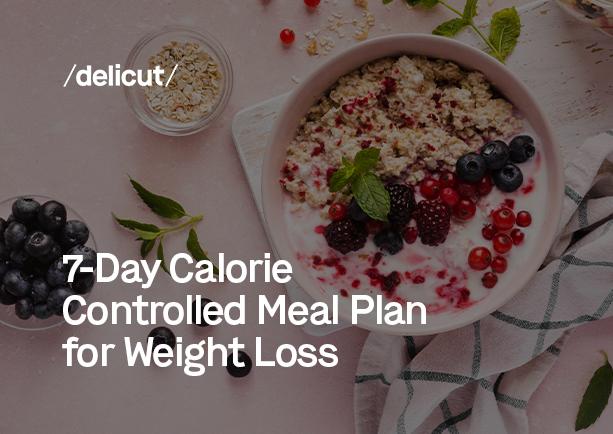7-Day Calorie Controlled Meal Plan for Weight Loss

One effective and sustainable approach to weight loss is following a calorie-controlled meal plan. This strategy is rooted in a simple yet fundamental principle for weight loss: consuming fewer calories than your body burns. However, successful weight loss isn't just about cutting calories; it's about ensuring those calories come from nutritious and balanced sources.
A well-structured, calorie-controlled meal plan can help you shed pounds, nourish your body, maintain muscle mass, and keep your energy levels steady. In this 7-day guide, we'll explore a meal plan for weight loss that balances calorie restriction with the essential nutrients needed for a healthy lifestyle.
Key Components of a Balanced Weight Loss Diet
A balanced weight loss diet is crucial for shedding pounds healthily and sustainably. It centers around several key components:
- Protein: Vital for building and repairing tissues, protein keeps you full longer and is essential for preserving muscle mass during weight loss. Include lean meats, fish, eggs, dairy, legumes, and plant-based proteins in your diet.
- Complex Carbohydrates: Unlike simple carbs, complex carbohydrates like whole grains, fruits, and vegetables provide lasting energy and are rich in fiber, aiding in digestion and satiety.
- Healthy Fats: Essential for nutrient absorption and brain health, healthy fats found in avocados, nuts, seeds, and olive oil should be consumed in moderation.
- Vitamins and Minerals: A varied diet rich in fruits and vegetables ensures you get a wide range of essential vitamins and minerals.
- Hydration: Drinking plenty of water aids metabolism, helps in appetite control, and improves overall bodily functions.
- Portion Control: Monitoring portion sizes helps manage calorie intake, a key factor in weight loss.
Day-by-Day Weight Loss Meal Plan Breakdown
This 7-day plan offers a balanced approach to a calorie-controlled diet, with each day totaling approximately 1200 calories. The meals are designed to provide a mix of protein, healthy fats, and carbohydrates to support weight loss while maintaining energy levels and overall health.
Day 1
- Breakfast: Greek yogurt with a handful of berries and a sprinkle of granola (approx. 300 calories).
- Lunch: Grilled chicken salad with mixed greens, cherry tomatoes, cucumber, and a light vinaigrette (approx. 350 calories).
- Dinner: Baked salmon with steamed broccoli and a small serving of brown rice (approx. 400 calories).
- Snacks: An apple and a small handful of almonds (approx. 150 calories).
Day 2
- Breakfast: Scrambled eggs with spinach, tomatoes, and a slice of whole-grain toast (approx. 300 calories).
- Lunch: Turkey and avocado wrap with whole-grain tortilla (approx. 350 calories).
- Dinner: Stir-fried tofu with mixed vegetables and quinoa (approx. 400 calories).
- Snacks: Carrot sticks with hummus (approx. 150 calories).
Day 3
- Breakfast: Oatmeal topped with sliced banana and a drizzle of honey (approx. 300 calories).
- Lunch: Lentil soup with a side of whole-grain bread (approx. 350 calories).
- Dinner: Grilled shrimp with a garden salad and a small baked potato (approx. 400 calories).
- Snacks: A pear and a low-fat cheese stick (approx. 150 calories).
Day 4
- Breakfast: Smoothie with spinach, banana, almond milk, and a scoop of protein powder (approx. 300 calories).
- Lunch: Quinoa salad with black beans, bell peppers, and a lime vinaigrette (approx. 350 calories).
- Dinner: Chicken stir-fry with a variety of vegetables and a small serving of jasmine rice (approx. 400 calories).
- Snacks: A small bowl of mixed berries (approx. 150 calories).
Day 5
- Breakfast: Whole grain toast with avocado and poached egg (approx. 300 calories).
- Lunch: Tuna salad over mixed greens with a whole-grain roll (approx. 350 calories).
- Dinner: Baked cod with asparagus and a side of quinoa (approx. 400 calories).
- Snacks: Greek yogurt with a sprinkle of nuts (approx. 150 calories).
Day 6
- Breakfast: Bran cereal with skim milk and strawberries (approx. 300 calories).
- Lunch: Chicken Caesar salad with light dressing (approx. 350 calories).
- Dinner: Veggie burger on a whole-grain bun with a side salad (approx. 400 calories).
- Snacks: An orange and a handful of walnuts (approx. 150 calories).
Day 7
- Breakfast: Cottage cheese with pineapple chunks and a handful of walnuts (approx. 300 calories).
- Lunch: Roasted vegetable and hummus wrap in a whole-wheat tortilla (approx. 350 calories).
- Dinner: Grilled steak with steamed green beans and a small serving of sweet potato (approx. 400 calories).
- Snacks: A banana and a small handful of pumpkin seeds (approx. 150 calories).
Conclusion
This journey is not just about reducing calorie intake but about embracing a lifestyle that focuses on balanced, nutritious eating. While calorie counting is a core aspect, the emphasis should always be on the quality of the food consumed.
The diverse and balanced meals in this plan are designed to ensure you get the necessary nutrients your body needs to function optimally while still enjoying delicious and satisfying dishes.
Remember, sustainable weight loss is a gradual process that involves making healthier food choices and developing long-term dietary habits. It's about finding a balance that works for you and your body.
FAQs
1. What is a calorie-controlled meal plan for weight loss, and how does it work?
A calorie-controlled meal plan for weight loss is a dietary approach where you consume a specific number of calories each day, lower than your body’s daily calorie requirement. This creates a calorie deficit, leading to weight loss. The plan involves measuring and tracking calorie intake while ensuring balanced nutrition from a variety of food sources.
2. How many calories should I aim for each day on a 7-day weight loss meal plan?
The daily calorie target can vary based on individual factors like age, gender, activity level, and weight loss goals. Generally, a common approach is to aim for 1200-1500 calories per day for women and 1500-1800 calories per day for men. Consulting with a healthcare provider or dietitian can help determine the best calorie target for your specific needs.
3. Can you provide sample meal ideas for each day of a 7-day calorie-controlled weight loss plan?
Please refer to the blog for a detailed 7-day calorie-controlled meal plan. Each day includes breakfast, lunch, dinner, and snacks, carefully portioned to fit within a calorie-controlled framework while providing balanced nutrition.
4. Are there any specific foods or nutrients I should focus on or avoid during this meal plan?
Focus on nutrient-dense foods like lean proteins (chicken, fish, legumes), complex carbohydrates (whole grains, vegetables, fruits), and healthy fats (avocados, nuts, olive oil). These foods provide essential nutrients and help maintain satiety. Avoid or limit high-calorie, low-nutrient foods like sugary snacks, processed foods, and excessive amounts of saturated and trans fats. Also, be mindful of portion sizes and avoid overeating, even of healthy foods.
5. What are some tips for staying consistent and successful on a 7-day calorie-controlled meal plan for weight loss?
Plan Your Meals: Pre-plan your meals for the week to avoid impulsive eating.
Track Your Calories: Use a food diary or an app to keep track of your calorie intake.
Stay Hydrated: Drink plenty of water, as it can help with hunger and overall health.
Eat Regularly: Don’t skip meals, as it can lead to overeating later.
Incorporate Variety: Keep your meals interesting with a variety of foods to avoid diet fatigue.
Listen to Your Body: Pay attention to hunger and fullness cues.
Stay Active: Combine the diet with regular physical activity for optimal results.
Seek Support: Connect with a support group or friends for motivation and accountability.
Read More:
Muscle Gain Diet Plan with 7 Day Meal Planning
Beat the Sugar Cravings Top 5 Meal Plans for Diabetic People
Lose the Extra Pounds 5 Great Diet Meals for Your Dinner
Related Blogs
Why do most people in the UAE get their calories wrong
Dec 8, 2025 | 6DASH Diet Meal Plan
Nov 11, 2025 | 8Fatty Liver Meal Plan
Oct 31, 2025 | 8Pregnancy Diet Meal Plan
Oct 27, 2025 | 82000 Calorie Meal Plan
Oct 1, 2025 | 8Intermittent Fasting Diet Plan
Sep 5, 2025 | 81000 Calorie Meal Plan
Sep 5, 2025 | 8High-Protein Meal Plans
Sep 5, 2025 | 8How to Choose the Right Meal Plan for Your Fitness Goals
Sep 5, 2025 | 8The GM diet plan: Is it possible to shed fat in just 7 days?
Sep 5, 2025 | 8






